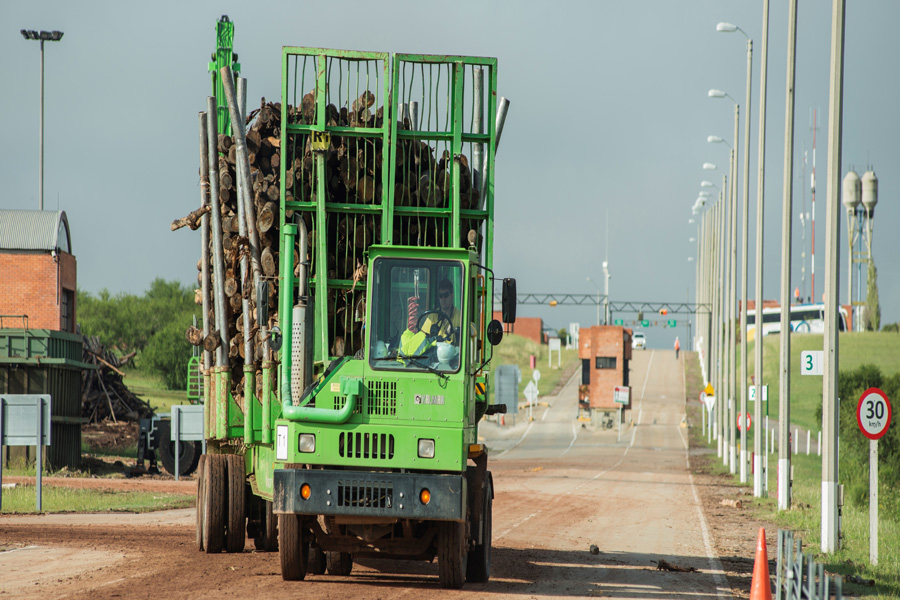 A truck-load of values
A truck-load of values
Around four million cubic meters of eucalyptus are annually transported to the Montes del Plata in Uruguay, a large pulp mill 50%-owned by Stora Enso. In a country of expansive plains and minimal heavy traffic, the increase in wood truck traffic has required a comprehensive approach to road safety.
Whereas the Montes del Plata pulp mill is located at Punta Pereira in south-western Uruguay, the company’s plantations are mainly located in central and north-western parts of the country. Around half of the eucalyptus is transported directly to the mill site by truck. The other half is first driven to the TLM port in the West Uruguayan town of Fray Bentos, from where the wood is shipped to the mill site. Since the start-up of the pulp mill in 2014, trucks have daily travelled hundreds of kilometres along the narrow countryside roads to the port and mill, often passing through small villages.
“Almost 300 wood trucks enter the mill site and the TLM port every day so we identified increasing road traffic as a key sustainability challenge from the outset. Our all work targets zero road accidents,” says Pablo Acosta, Head of Terrestrial Transport at Montes del Plata.
Zero severe accidents
Despite truck transport posing road safety challenges, it also has a positive contribution to society by directly and indirectly creating hundreds of new permanent jobs in rural areas of Uruguay. This is significant in a country where most economic activity takes place in the country’s capital, Montevideo. All Montes del Plata’s truck traffic has been outsourced to 16 logistics companies with a total of 900 truck drivers.
To address road safety early on, Montes del Plata conducted a vulnerability analysis prior to the start-up of the mill. This included classifying the condition of Uruguayan roads, mapping sensitive areas such as roads passing villages and schools, and analysing past accidents, even those not related to Montes del Plata. The analysis is repeated annually.
“Based on this analysis, we target and conduct our annual activities, including engaging with local authorities and communities, visiting schools to raise awareness of truck traffic, and placing signs where necessary,” Pablo Acosta explains.
Every truck is marked with a phone number for anyone to contact the company and a GPS system allows full traceability from the field to the mill. Any feedback from communities can be easily traced to the truck, wood load, and driver in question. Since 2014, there has been only one complaint per month on average for all Montes del Plata trucks on the road.
The safety statistics are equally as impressive. On average, there has been 0.99 accidents per one million kilometres, and all the accidents have been minor, such as load breaks.
Transporting more than wood
The drivers have had a key role in the excellent safety record. Before receiving a license to work for Montes del Plata, all drivers attend a 60-hour compulsory training session, and their physical and mental health is assessed, followed by quarterly trainings. The drivers also participate in community road safety activities, such as workshops in rural schools, where they build personal relationships with the communities.
“Timber trucks are a relatively new phenomenon in Uruguay so children are very interested in them. By talking to drivers in the workshops, the children get a better understanding of the stopping distance of a truck – and know not to play in the streets,” Acosta explains.
Once a year, the drivers gather to celebrate their good road safety achievements, and the drivers and truck companies with best safety performances are rewarded.
“We acknowledge that we are carrying more than wood on Uruguayan roads. We are transporting values,” Acosta concludes.
Pablo Acosta, Head of Terrestrial Transport at Montes del Plata
